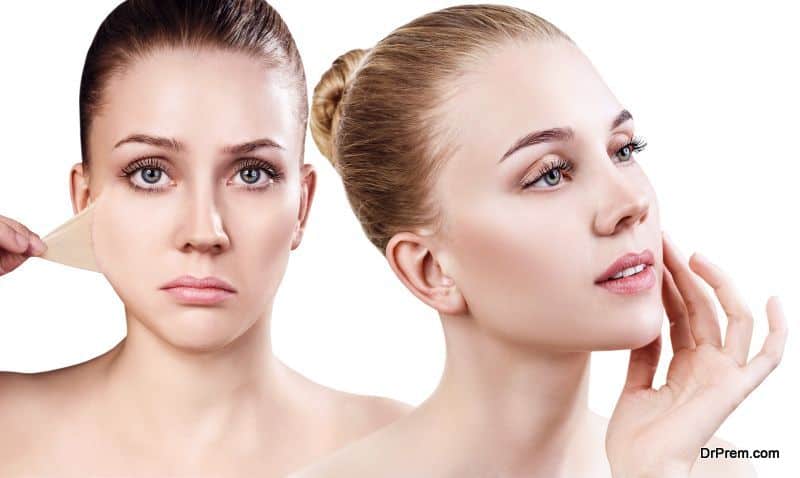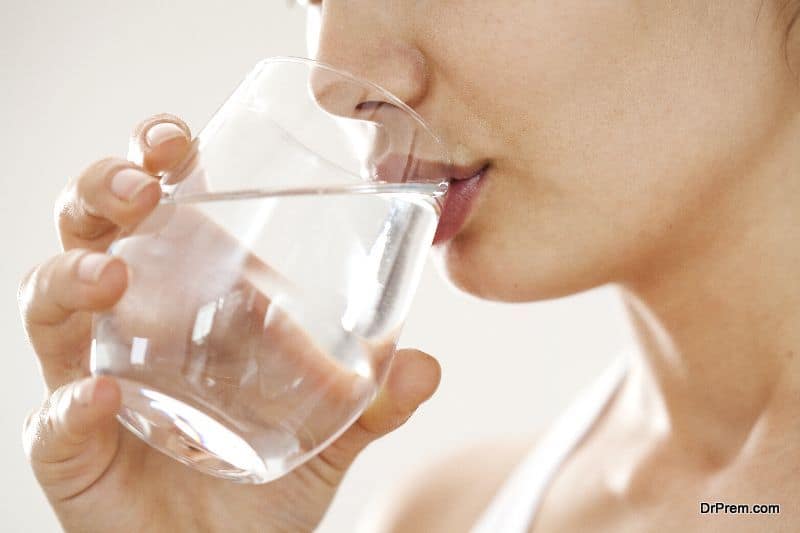A popular concept about skin care is more water you drink better is your skin health. Everyone desires to have a glowing skin. Models of the glam world swear by excessive water intake to maintain their envious skin texture and we, the common public, blindly accept this as a time-tested solution to improve skin health.
Can guzzling tons of water improve your skin health?
Well, if drinking water could solve all skin related issues, it would have been wonderful. But such experiments hardly come by that would conclusively establish the role of water intake for improving skin quality.
An assessment made by a well-known dermatologist Ronnie Wolf at Kaplan medical center in Israel could locate just one research study to find out the impact of long-term water intake on human skin. After a month-long study, the group that drank extra mineral water manifested a reduction in skin density. According to some, this was a symptom of skin retaining a higher volume of moisture.
Those who consumed ordinary tap water experienced a thickening of skin density. But irrespective of the type of water they consumed, wrinkles and smoothness of their skin remained the same. The quality of water did not have any impact in this area.
Your body does not store additional water:
Another popular notion goes that if you drink extra water, your body would keep it in storage. However, it all depends upon how frequently you have consumed a given volume of water. If you have drunk in a number of glasses of water within a span of 15 minutes you would simply feel rushing to the toilet for emptying your bladder. The extra water passes out through urine.
However, if you drink the same volume of water over a span of 2 hours, more water is preserved in your body. A study revealed that taking in 500 ml of water escalates the blood flow through the capillaries present in our skin layer. But the skin was assessed half an hour post drinking session and it still remains an enigma whether water really has a contributory role in improving skin quality.
Skin health depends on a lot more on other factors than water intake:
We could always have a debate against it, placing a counter logic that our skin already contains 30 % of water which aids us in looking plumpy and glowing. This might be partially correct but skin health is governed more by other important factors like genetic makeup, exposure to sunlight and impact of smoking.
It may be the food and not water that contributes more to your skin health:
The convention of drinking eight glasses of water to improve your skin health may not hold true. Exactly what volume of water intake is necessary to flush out toxins from kidneys is yet to be fixed. It all depends upon the body, type of work done and food intake of the person in question.
Food plays an important role and contains lots of water. Think of a diet rich in fruits, especially watermelons and cucumber would already push a lot of water in the system. So taking extra water, in this case, would be putting excess strain on the detoxifying mechanism of the body.
It will again depend upon several other factors like the surrounding temperature and the geographical location of the person concerned. In the US, on an average, the water content in food is about 22% while in Mediterranean region where people consume a higher quantity of fruits, water-content in nutrition intake is much higher.
Consider other variables beside water intake:
A hydrated skin appears glossier and healthy compared to dry skins. As because the skin itself is made up of cells they function far better when they are kept lubricated. More water consumption would mean better cell efficiency that would impart more ‘ life ‘ to the skin. However, that does not imply drinking gallons of water. Humidity, temperature, caffeine consumption, nature of the profession, altitude and a host of other variables come into play.
Moisture retention capacity matters:
The factor which is far more important for your skin health is the potential for retaining moisture by your skin. Application of moisturizer on a tad damp skin will aid in absorption of skin care product more readily compared to its application on the dry and flaky skin.
The outer layer of the skin, the stratum corner is devised to arrest dehydration and has a significant role in waterproofing of the skin. Studies further show that increasing water intake will enhance skin thickness and help skin stay hydrated.
Gulping down glasses of water has the least impact on skin quality. Water retention power of the skin is the real issue. You can keep your skin hydrated and glowing by following ways:
- Help your skin produce oil naturally or apply skin care moisturizer.
- Pick foods containing adequate quantities of good fats and limit the intake of refined carbs.











